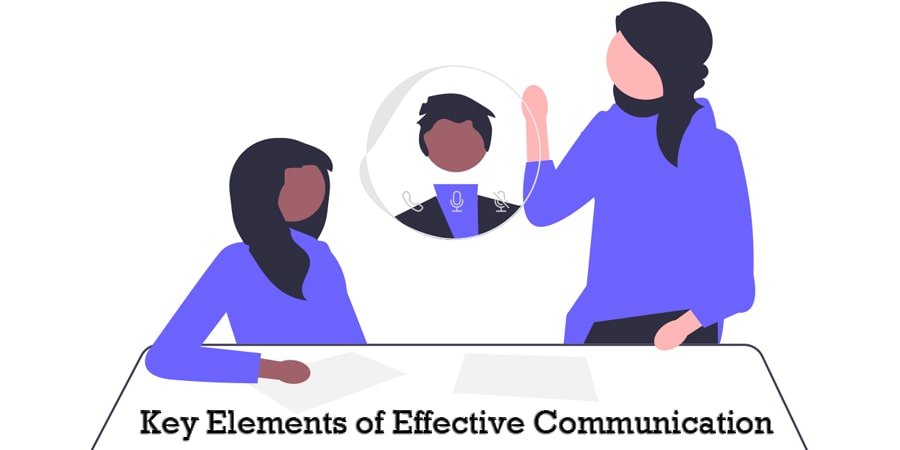Key Elements of Effective Communication

Your words are your weapons; use them wisely.
Effective communication is the foundation of every meaningful interaction, influencing everything from personal relationships to professional achievements. It is more than just exchanging words; it is about forging connections on a deeper level. Imagine a world where misunderstandings are rare, and ideas flow effortlessly.
The ability to communicate clearly and empathetically has never been more vital. Whether you are delivering a presentation, navigating a tough conversation, or chatting with a friend, how you express your message can change the outcome entirely.
Here are the key elements of effective communication
Speech: The Power of Words
Speech is the most common form of communication, where messages are conveyed verbally through words. To communicate effectively, your speech should be clear, concise, and purposeful.
Choose your words wisely, focusing on the key details. Though words may account for only 10% of communication, they still hold significant power. Mastering the art of speaking with various people is essential to becoming an effective communicator.
Confidence: The Backbone of Communication
Confidence in your knowledge and understanding sends a strong message to your friends and colleagues. When you speak with confidence, others are more likely to trust and believe in what you say. On the other hand, a lack of confidence can lead to frequent changes in thought, making your communication appear less reliable. Confidence is crucial in ensuring that your message is received as intended.
Body Language: The Silent Communicator
Nonverbal communication – through body language, hand gestures, eye contact, and facial expressions—plays a critical role in conveying your message. To communicate effectively, you must be aware of and utilize these nonverbal cues.
Pay attention to the body language of others as well. It can provide insights into their emotions and attitudes, allowing for a deeper understanding. Eye contact is essential, as it helps establish trust. Simple gestures like nods or glances can signal agreement. Maintaining a straight posture and avoiding crossed arms will align your body language with your words, reducing any potential confusion.
Clarity: The Key to Understanding
Clear communication leaves no room for ambiguity. To ensure your message is understood, focus on simplicity and confidence. Simplicity is the cornerstone of clarity.
Tone of Voice: The Emotion Behind the Words
Your tone of voice is a powerful tool in communication. It can convey emotions and set the tone for the entire conversation. Whether you aim to sound credible, friendly, passive, or authoritative, your tone should match the message you intend to convey.
Active Listening: The Art of Understanding
Effective communication isn’t just about speaking; it is also about listening. Active listening means truly understanding the other person’s perspective, not just hearing their words. It involves paying attention to both verbal and nonverbal cues, such as body language and tone.
To practice active listening, refrain from interrupting. Wait your turn to speak, and focus on the conversation. Avoid jumping to conclusions or passing judgment, even if you disagree. Assumptions can hinder true understanding.
Creating the Right Environment
The environment plays a significant role in communication. Choosing the right location and time to address your audience is crucial. You want your audience to be open to your ideas; otherwise, the conversation may become one-sided and unproductive. A receptive environment ensures that the exchange of words is meaningful.
Managing Stress: A Crucial Skill
Stress can distort your perception and affect your ability to communicate effectively. It can disrupt your thoughts, behavior, and responses, leading to misunderstandings. To avoid sending mixed signals and engaging in unproductive conversations, it’s essential to manage stress.
Everyone has different methods for handling stress. Some find relief in physical activities like running, while others benefit from meditation. The key is finding what works best for you and practicing it regularly.
The Role of Feedback
Giving and receiving feedback is a fundamental communication skill. Feedback shows that you are listening and value the other person’s input. It fosters mutual understanding and encourages continuous improvement in communication.
Conclusion
Effective communication is an art that can transform every aspect of your life. By mastering speech, building confidence, understanding body language, maintaining clarity, using the right tone, practicing active listening, creating the right environment, managing stress, and embracing feedback, you can become a more effective communicator.
When you communicate with clarity, empathy, and purpose, you not only enhance your relationships but also open doors to new opportunities in your personal and professional life. The journey to mastering communication is ongoing, but the rewards are well worth the effort.